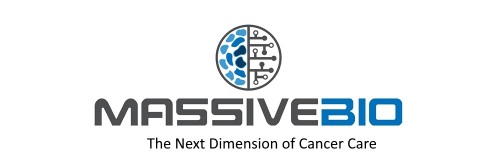NEW YORK--(BUSINESS WIRE)--Massive Bio, Inc., a leader in precision medicine and artificial intelligence (AI)-enabled patient-centric oncology clinical trial enrollment, announced today it has launched its SYNERGY-AI Oncology Clinical Trial Command Center (OCTCC) with the mission to disrupt and accelerate the clinical trial enrollment process. Akin to the NASA Deep Space Network, SYNERGY-AI OCTCC is a real time data and communication network between patients, sites, and pharmaceutical companies, with the Massive Bio AI-enabled engine orchestrating these stakeholders for successful operations. SYNERGY-AI OCTCC also coordinates instant patient identification through two dozen direct and in-direct patient identification channels, privacy-compliant AI-based patient pre-screening, enrollment concierge, and just-in-time site activation.
Massive Bio had previously announced the launch of the Largest AI Enabled Just-in-Time Precision Oncology Clinical Trial Network in The World, the contract by the National Cancer Institute (NCI) to develop and characterize the Deep Learning Clinical Trial Matching System (DLCTMS), the launch of its trial finder mobile app, and its successful SOC 2 certification. Following its most recent financing round, Massive Bio’s trial enrollment platform has been evolving into a command center to supply research stakeholders with real-time communications, data, and enhanced analytics.
“The same way NASA manages space flights, usually from the point of launch until the end of the mission, Massive Bio’s command center is taking its program to the next level by using data, analytics, patient engagement, and research site networks to coordinate patient enrollment and site activation in real-time,” said Selin Kurnaz, PhD., Co-founder and CEO of Massive Bio. “History is being written today as we embark on our ambitious mission to kickstart the renaissance in oncology clinical trial enrollment. We are all aware that the process between patient identification and enrollment is significantly inefficient and ineffective, especially for those patients that are currently not getting treatment in research-oriented sites. Static and siloed big data, obsolete databases, and traditional clinical trial matching platforms within healthcare are yielding sub-optimal results. Thus, we analyzed the world’s most sensitive, well-coordinated and error free platforms, like the NASA Deep Space Network, combined them with clinical research and engineering, applied them to the oncology clinical trial enrollment, and that is how Massive Bio’s command center is coming to life.” Dr. Kurnaz also stated, “We understand that we are signing up for an earth shatteringly difficult task – this is a multi-year effort that requires a multi-pronged approach, and we have been preparing for this launch over the last couple of years. In our vision, a cancer patient taps to his/her smart device to activate all required pre-screening procedures and gets into his/her autonomous vehicle to complete the non-home-based vital portion of the clinical research process within less than 30-minutes driving distance site, while trial education, physician coordination, consent, pre-screening, logistics coordination, insurance verification, and site activation are taking place simultaneously prior to arrival. Eventually, this is also going to revolutionize how fast an oncology drug can hit the market and introduce further competition to the pharmaceutical industry.”
While SYNERGY-AI OCTCC materially optimizes workflow efficiencies for global pharmaceutical companies and contract research organizations, it also supports Massive Bio in performing in silico clinical trial enrollment simulations through the patient journey while constantly and drastically reducing the time between patient identification and enrollment. Dr. Kurnaz added, “The current process from patient identification to enrollment on an oncology clinical trial may take weeks, and Massive Bio is working to reduce this time to 72 hours for non-biomarker based clinical trials. It is important to reemphasize that these are not the patients that are currently at research sites or where the specific trial is being conducted. These patients can be anywhere waiting to get access to a clinical trial. For biomarker based clinical trials, Massive Bio is trying to eliminate the inefficiencies of Next Generation Sequencing (NGS) based test ordering and sequencing time so that patients do not drop from the enrollment value chain while waiting for results. The overall goal in a couple of years is to reduce the patient identification to enrollment to a few hours and set a new industry standard.”
As pressure to optimize clinical research worldwide continues to mount, these NASA-like centers provide centralized accessibility, monitoring, and control over organizational processes, and coordinate the day-to-day activities of the clinical research system. In collaboration with an ever-growing network of oncology research sites, patient advocacy groups, data aggregators, specialty pharmacies, insurance companies, CROs and pharmaceutical companies, the SYNERGY-AI OCTCC was designed using engineering methods and augmented intelligence powered by clinical experts to develop advanced predictive analytics and display real-time information in a mission control-like command center. These data allow the Massive Bio operators to act fast, make better decisions in real-time, reduce costs and improve quality, and connect data from different source systems that do not usually talk to one another or interact, and help research care teams activate sites and enroll patients in a way that may be otherwise impossible in the traditional setting. The command center serves as the place to expedite patients, to get them in the right trial at the right time, and to determine any barrier that prevents them from accessing clinical research options.
Massive Bio’s Co-founder and Chief Medical Advisor, Arturo Loaiza-Bonilla, MD, MSEd, mentioned that, “To date, a small number of health systems across the world have established Health System Command Centers to create a centralized hub made up of an interdisciplinary team to coordinate care across their systems, expand patient access, and continually improve outcomes, however, such a system is nonexistent in the oncology clinical trial space, and Massive Bio is uniquely positioned to lead this endeavor quickly and at scale, using its precision oncology footprint, patient engagement, and technology.” In addition, he mentioned, “Just like GPS satellites must adjust to compensate for time dilation and coordinate properly with systems on Earth, Massive Bio brings that accelerator ‘Gamma factor’ to clinical research. It is an exciting time for the company, being able to connect the dots in oncology research and allowing a cancer patient and their oncologist to access clinical trials in real time at one’s fingertip, using the app to authorize the medical records release, analyze eligibility through SYNERGY-AI, potentially activate the trial at their point-of-care, utilize telemedicine to sign consent and quickly enroll, all while advancing research and new therapies that may benefit many more; it is an unprecedented breakthrough to actually see it is possible through seamless coordination and collaboration.”
“Data-driven machine learning has not reached its full potential in healthcare because it is siloed, fragmented, and its use cases in digital health, precision medicine and clinical research are plagued by inefficiencies, operational, and privacy challenges, which make it quite difficult to implement,” said Cagatay Culcuoglu, Co-founder and CTO of Massive Bio. In addition, he has added that “We are laser focused to quickly anticipate the needs of our pharmaceutical clients, research sites, and clinical teams and provide them the proper tools and resources when needed the most. For example, we are combining patient notification from our enterprise partners, our CRM system, and SYNERGY-AI clinical trial matching platform to provide just-in-time patient identification and cohort development. Since we also have the ability to pre-screen the patients with our technology and overlay with high value-added services to patients and sites, we convert just-in-time patient identification to just-in-time site activation. Another example is trials lagging anticipated enrollment or patients who may not have completed pre-screening procedures, as time passes start to display alarms and a code system to prioritize them. Once the lag reaches a certain threshold, it triggers an algorithm to identify barriers and figure out what is wrong. We engage with the clinical research team, to solve the potential issue, which is also incorporated to our machine learning process. Thus, we have been able to optimize processes quickly across a large portfolio of studies.”
About Massive Bio, Inc.
Massive Bio’s (https://massivebio.com/) mission is to provide access to clinical trials for every cancer patient regardless of his/her location and/or financial stability. Massive Bio is an AI-driven platform connecting cancer patients and their oncologists to bio-pharmaceutical clinical trials, yielding profound improvement in access and match rates, leading to faster drug development timelines, and creating a novel oncology data ecosystem for improved protocol design and real-world insights. Massive Bio controls the patient enrollment value chain starting with patient identification, following with AI-based virtual pre-screening outside the site, and resolving last mile issues for clinical trial enrollment. While improving cancer patients lives, Massive Bio serves close to two dozen pharmaceutical companies, contract research organizations (CROs) and hospital networks. In addition, Massive Bio has been awarded an SBIR contract by the National Cancer Institute (NCI) to develop and characterize its Deep Learning Clinical Trial Matching System (DLCTMS), Contract No. 75N91020C00016. Massive Bio provides oncology dedicated patient recruitment, site selection, real-world data services, and AI-based trial prescreening services to its enterprise customers. Massive Bio was founded in 2015, is headquartered in NYC, and is privately funded by strategic and financial investors.




